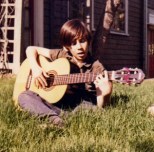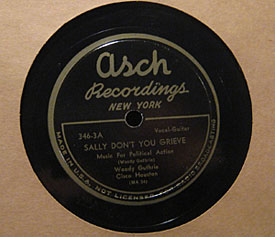When I was maybe six years old, my parents bought me a little portable record player. It was about a foot square, closed up like a suitcase, and had four speeds: 1 6, 33 1/3, 45, and 78. They wouldn’t let me play their records on it, but I had a few children’s folk LPs — one by Tom Glazer, and a couple of Everybody Sing! anthologies — and somehow I also ended up with my grandparents’ 78 albums.
6, 33 1/3, 45, and 78. They wouldn’t let me play their records on it, but I had a few children’s folk LPs — one by Tom Glazer, and a couple of Everybody Sing! anthologies — and somehow I also ended up with my grandparents’ 78 albums.
My mother’s family were refugees from Nazi Vienna and old-line Communists — till the day he died, my grandfather had the complete works of Marx, Lenin, and Stalin in his home office, in German. (Also the complete works of Joseph Conrad, Jack London, and Mark Twain.) I don’t think they were politically active after coming to the United States,  but along with dozens of classical albums, they had the classic Communist record collection of the early 1940s: Paul Robeson, the Red Army Chorus, the International Brigades from the Spanish Civil War, Josh White, the Almanac Singers, and the Union Boys. The Union Boys wasn’t actually a group — it was just a bunch of singers who got together to record an album’s worth of songs about union organizing and the war effort, among them Pete Seeger, Burl Ives, Tom Glazer, Josh White, Brownie McGhee and Sonny Terry, plus one side by Woody Guthrie and Cisco Houston.
but along with dozens of classical albums, they had the classic Communist record collection of the early 1940s: Paul Robeson, the Red Army Chorus, the International Brigades from the Spanish Civil War, Josh White, the Almanac Singers, and the Union Boys. The Union Boys wasn’t actually a group — it was just a bunch of singers who got together to record an album’s worth of songs about union organizing and the war effort, among them Pete Seeger, Burl Ives, Tom Glazer, Josh White, Brownie McGhee and Sonny Terry, plus one side by Woody Guthrie and Cisco Houston.
 I played those records constantly and learned most of the songs, and these two were particular favorites. I suppose part of the appeal was the war — despite my parents’ pacifist leanings, I played with toy soldiers and dug trenches and all that kind of stuff, and it was exciting to sing about rolling into Berlin with your buddies from the union and going after Hitler. I didn’t understand all the words, of course — I don’t think I knew the meaning of either UAW or CIO — but thirty years later, when I helped organize a freelancer’s group at the Boston Globe under the auspices of the National Writers Union, I was particularly pleased that we were a subsection of the UAW. It kind of brought everything full circle, and felt like I’d stayed true to my early friends.
I played those records constantly and learned most of the songs, and these two were particular favorites. I suppose part of the appeal was the war — despite my parents’ pacifist leanings, I played with toy soldiers and dug trenches and all that kind of stuff, and it was exciting to sing about rolling into Berlin with your buddies from the union and going after Hitler. I didn’t understand all the words, of course — I don’t think I knew the meaning of either UAW or CIO — but thirty years later, when I helped organize a freelancer’s group at the Boston Globe under the auspices of the National Writers Union, I was particularly pleased that we were a subsection of the UAW. It kind of brought everything full circle, and felt like I’d stayed true to my early friends.
